Willing Worcestershire Completed
- 29th April 2022
Our Conservator Rhonda has just completed the colossal task of repairing and preserving 15 boxes of Worcestershire wills which until now had been sorely lacking the attention they needed.
This project was part of a grant from the National Conservation of Manuscripts Trust (NCMT). These wills are from a collection consisting of over 1050 boxes. The collection includes Wills, Inventories, Letters of Administration and other papers dating back to 1493. Over their many years of life before they came to us, the items had suffered from prolonged poor storage which has resulted in a combination of damage, including areas where the paper is powdery/flaky and susceptible to further damage when handled, however carefully, as well as water staining, surface dirt and creasing. Surface dirt and creases make the documents difficult to read, whilst attempts to remove creases may result in further damage with potential loss to the document. Approximately 176 boxes dating from 1611-1676 remained in such a fragile condition that they could not be issued in the searchroom and as such are unavailable for researchers to access.
Conservation aims to restore and preserve these documents, making them suitable for public handling. With the 15 boxes recently completed by Rhonda and 10 boxes restored elsewhere the number of boxes unavailable to the public because of their poor condition is now down to roughly 150.
The 15 boxes contained 2669 total documents, of these 2435 were paper and 234 parchment. These documents were treated by being dry cleaned using a latex sponge followed by washing in cold water for an hour, hot water for an hour and alkaline solution for approximately 30 minutes to deacidify the paper. 639 documents required no further treatment, 790 were encased in tissue for support and 1006 documents required infilling with handmade paper. Of the parchments 115 were repaired and 119 just needed cleaning. The most delicate of these documents would’ve taken roughly 3 hours to complete.
When asked if there were any documents too ruined to restore Rhonda said “Oh no, I can do something with anything” showing not only her skill but the accuracy conservation projects have, leaving no document out of the hands of future researchers. For an in depth look at the restoration process we had a deep dive in the previous post about this collection.
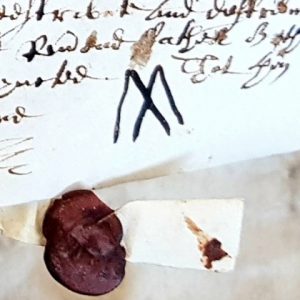 During this project Rhonda noticed interesting markings on some of the documents. There is some debate about the significance of these markings but we do know that this is the way someone chose to formally add their agreement to a document that made legally binding requirements of them. Some of these markings are characteristic of typical initials and lettering but others are closer to doodles or drawings. The popular theory behind markings instead of traditional signatures is that they are a form of signature for people who may not have known how to read or write. Because some marking have no resemblance to initials or lettering at all another theory is that these doodles signalled importance or commitment, showing that there was more significance in the document then a normal signature could connote. There are many examples of markings like this and, if you want to read more, we have a blog about those markings here.
During this project Rhonda noticed interesting markings on some of the documents. There is some debate about the significance of these markings but we do know that this is the way someone chose to formally add their agreement to a document that made legally binding requirements of them. Some of these markings are characteristic of typical initials and lettering but others are closer to doodles or drawings. The popular theory behind markings instead of traditional signatures is that they are a form of signature for people who may not have known how to read or write. Because some marking have no resemblance to initials or lettering at all another theory is that these doodles signalled importance or commitment, showing that there was more significance in the document then a normal signature could connote. There are many examples of markings like this and, if you want to read more, we have a blog about those markings here.
This project began in June 2021 and it took roughly 10 months to complete. The documents are now back on the shelves in the strongroom and will hopefully soon be available for researchers to consult for the first time in many years.
If you have a need to access any Worcestershire records the Archives and Archaeology service here in the Hive have the largest collection of Worcestershire documents available including almost everything you may need including wills, maps, newspapers, books and much more going back hundreds of years. These documents like most of our collection, are available to use in The Hive. Where possible fragile things such as wills and newspapers should be looked at on microfilm, which we can facilitate. The archive searchroom is available on level 2 of the Hive to any members of the public if you have an archives card. You can apply for an archives card here.
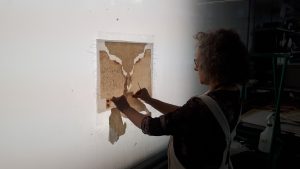
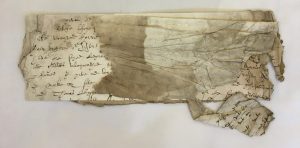
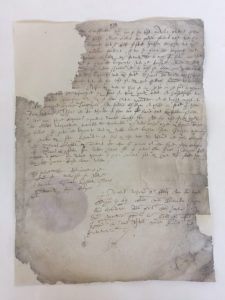
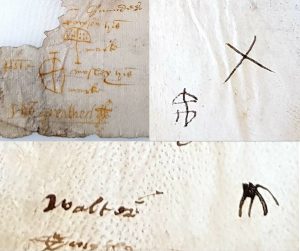
Excellent work
Well done Rhonda, a fascinating project, but I’m sure some of it must have been very tricky.
These wills and documents will prove invaluable to local researchers.